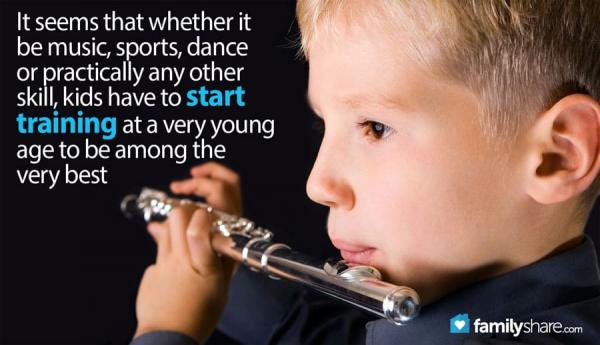
Studies show music lessons can have a wonderful effect on the mind, including improving memory, attention, reading skills and even math comprehension. It's no wonder that parents all over the globe are enrolling their children in music lessons of all sorts. But how soon should lessons begin?
Some parents are eager to start their kids' lessons as early as possible, hoping to give their child a chance to be a standout. It seems that whether it be music, sports, dance or practically any other skill, kids have to start training at a very young age to be among the very best.
Why do you want your child to start?
As a parent, you must ask yourself what your purpose is for beginning music lessons. Do you want to make music a part of their life? Improve their scholastic skills overall? Get some culture and refinement? Have a skill to really excel at? Any of these can be a perfectly valid reason, but be aware that you will be making a choice for the child at an age where they are too young to really understand for themselves. Beware of making a lifelong commitment on their behalf that may not be the right choice for them as they grow older.
Many parents experience bitter disappointment when they invest a huge amount of time and money into the hope of making their child a superstar. This is difficult because to have the best chance to be a standout, parents will have to require their child to make sacrifices in time with friends, leisure activities and so on. This can cause conflict in the relationship that may ultimately be not worth it.
Starting at an early age
But in more general terms, music lessons can begin at an early age without harm. Kids as young as three years old can enjoy and benefit from lessons. There are various music programs that are specifically meant for the very young and help kids have fun while learning. For example, the Suzuki music program, for strings or piano, is designed to get kids started with music without needing to be able to read. (The benefits and drawbacks to the Suzuki method are a whole separate issue.)
That said, many private music instructors feel that unless the child shows a consistent interest in starting younger, waiting until reading is established is also a good choice. They feel that starting at 3, 4 or 5 does no harm (unless excessive force is used by the parent), but generally the older students progress at a faster rate and quickly make up the difference between them and a student who started younger. In other words, most ten-year-old piano students will be at roughly the same level whether they started at three or eight.
Parents can better make the decision on when to begin by asking these questions:
How interested is the child?
Realize that the newness and novelty will quickly wear off.
How able is the child to focus his/her attention?
Kids should be able to focus on a single task for at least fifteen minutes. Most lessons are at least 30 minutes long, although lessons are broken up into listening, playing and other activities.
Will starting at a young age build their interest, or will it cause them to judge music lessons unfairly because of their immaturity?
This question is nearly impossible to answer in advance, so parents will have to use their best judgment.
Use these guidelines to decide if your child is ready for music lessons.

